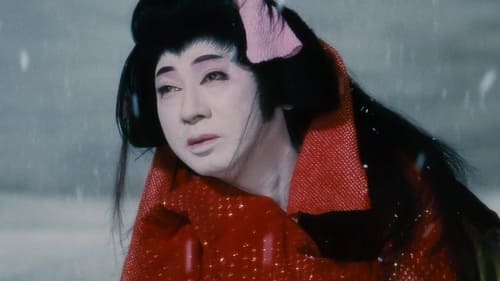
Yukinojo Nakamura / Yamitaro the Thief
Em uma excursão com seu grupo de teatro kabuku, Yukinojo, ator principal da trupe, acaba cruzando com os três homens que levaram seus pais ao suicídio, 20 anos antes. Yukinojo então trama sua vingança, primeiro seduzindo a filha de um deles e depois os levando à ruína.
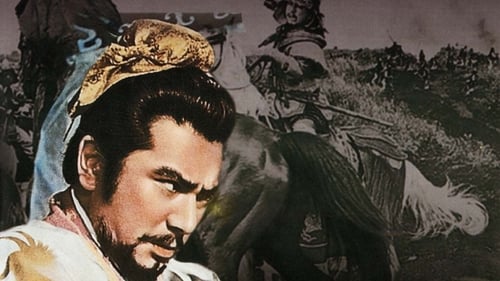
In 221 BC, Qin Shihuangdi conquered the rest of China. Qin's great accomplishments and also his serious faults are showed in this film. Qin adopted autocratic dictatorship and led a luxurious life: abolition of feudalism and the centralization of power in the form of a now-hereditary bureaucracy loyal to himself; burning books and burying scholars; the construction of a sumptuous palace for his concubines and also the Great Wall.


Mito Komon
Daiei Film Company's three biggest stars shine in this exciting story about Vice-Shogun Mito Komon's journey to the land of the Ainu. As the shogun's uncle, Lord Mito traveled about the nation seeking to make sure that corruption and injustice did not go unpunished. Traveling together with his two faithful bodyguards Kaku and Suke, they board ship for a voyage to the far northern island of Ezo (modern day Hokkaido) where the indigenous people called "Ainu" live. Somewhat like American Indians, the Ainu had their own culture which had not been subjugated by the Matsumae clan, rulers of the vast island. A revolt is brewing within the leadership of the Ainu, which threatens to destroy their peaceful lives. The elder lord and his retinue are the only ones who can stop this reign of terror!


Chouemon Takakura
Japan, 1643, as the Kato clan of Aizu falls from power two brave samurai will settle a dispute in the time-honored tradition of their clan, by drawing their blades in a duel to the death.

Ryūtarō Tsumura
A crime boss gets out of prison and tries to find who from his organization betrayed him.

The exciting story of Jirocho and his yakuza gang that controlled the area of the Tokaido during the latter days of the samurai era. Awesome fighting from Katsu Shintaro as One-Eyed Ishimatsu highlights this great tale taken from Japanese history!
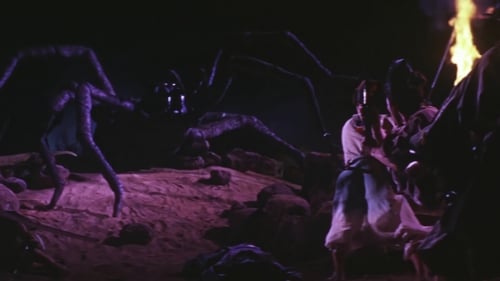
Shuten-dôji
A demon-faced monster seeking revenge appears in the forms of a gigantic ox and a huge spider! The young Genji warrior protects the Fujiwara Clan and the beautiful lady in tragic love! A grand visual epic told with mesmerizing extravagance!

During the reign of Shogun Hidetada, both Hirate Musashi and Okamoto Musashi strive to become the finest swordsman in the land by defeating the Yagyu clan's top instructors and then taking on Sasaki Kojiro!

Kitagawa Utamaro
Kitagawa Utamaro is a famous ukiyo-e artist known for his paintings of beautiful women. The courtesan who became his model became even more popular. Ocho, a resident of an apartment building, hears about this and secretly plans to follow Otose, the owner of Mizuta-ya, who became famous as Utamaro's model. At this time, the Kano school, headed by Kano Eikawa, which was under the control of the shogunate, is dissatisfied with Utamaro's fame and tries to compromise him…

Iemon Tamiya
In one of Japan's most frequently-told ghost stories, a murdered wife returns in an act of vengeance.
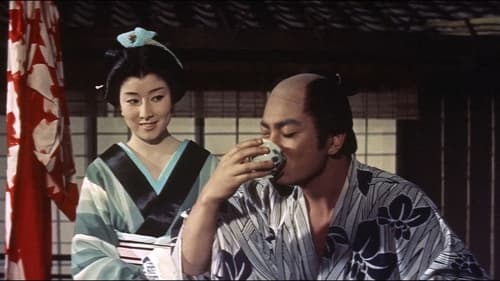
Shimizu no Jirocho
Legendary yakuza Shimizu Jirocho and his 28 henchmen travel the unruly path from a 'Fire Festival' in Akiba to a decisive battle by the Fujigawa.

Yatarô
Film directed by Kenji Misumi.

Araki Mataemon

Nichiren
During the 1200's, legendary Buddhist monk Nichiren returns from his studies to lead Japan out of moral crisis and prepare to fight Mongol invaders by creating a new form of Buddhism. He runs afoul of the existing Buddhist sects and their government supporters and is persecuted. Can Nichiren persevere before the Mogol fleet reaches Japanese shores?

Kuranosuke Ôishi
Um conto intemporal de honra e vingança, The Loyal 47 Ronin é a história verídica de um grupo de samurais que se tornou ronin (samurai sem mestre), após o seu Senhor ser obrigado a cometer seppuku (suicídio ritual) por agredir um oficial de justiça. Depois de pacientemente esperando e planejando por mais de um ano, eles executam um assalto ousado na propriedade do Senhor Kira, realizando a sua vingança, sabendo que eles iriam ser obrigados a cometer seppuku para reparar seu crime.

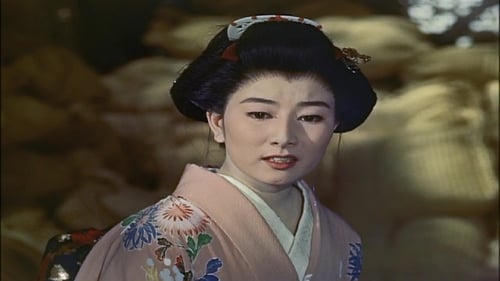
From the pen of Yoshikawa Eiji comes this exciting story. The Naruto Strait separates Tokushima from the islands of Awaji and Honshu. On Tokushima the mad lord dreams of conquest and forges a bloody revolt against the Tokugawa shogunate. A mysterious swordsman named Noriyuki Gennojo has crossed Naruto’s waters to uncover the Awa clan’s secrets. He puts his life on the line after finding a testament of Awa’s secrets, written in blood by a dying man. Joining Noriyuki are a female ninja who loves him, and the beautiful daughter of an enemy who’s sworn to kill him. Awa’s defenders willl stop at nothing to prevent the blood-soaked letter from reaching the shogun.

Floating Vessel (源氏物語 浮舟 , Ukifune) is a 1957 color Japanese film directed by Teinosuke Kinugasa. Drawn from parts of the famous Genji monogatari by Lady Murasaki.

A studio introduction version for Daiei Stars.
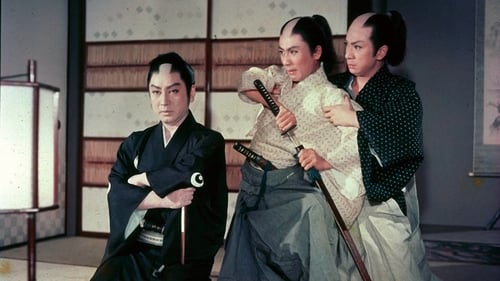
Tsukigata Hanpeita
During the bloody era of the Tokugawa Shogunate collapse, a man appeared capable of overthrowing a corrupt government and ending the feud between the Choshu and Satsuma clans. This is the story of Tsukigat Khanpayit, the sword maker of the Choshu clan, who, along with Katsuro Kogoro and Sakamoto Ryoma, sought to fulfill the dream of a new peaceful era in Japan. Can he realize his ideals or will he die in the chaos of internecine fights...

Kikunosuke

Jirô-Yoshinaka Kiso
The story of Yoshinaka during the tumultuous period of warring related to us in the Heike Monogatari. Close in setting to Kinugasa’s famous Gate of Hell (1953).

A Girl isn't Allowed to Love is a 1955 Japanese film directed by Teinosuke Kinugasa.
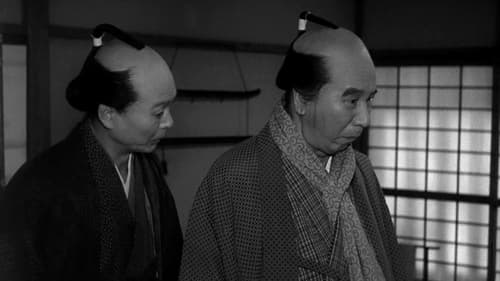
Mohei
No século XVII, esposa de um rico avarento vive insatisfeita e frustrada, e quando precisa de dinheiro para ajudar o irmão, recorre a um dos empregados do marido. Os dois são descobertos, mas o rapaz assume a culpa para salvá-la. Sabendo das traições do marido, ela decide arriscar tudo e fugir com o empregado.

A film about the Ghost of Okiku that's based on the kabuki play Bancho Sarayashiki.

Every year, at the festival, familiar merchants such as Toraemon, a magic trick, Tokubei, a blowgun, Kaji, acrobatics, and Unsaibo, a ritual, gather toward the port town.
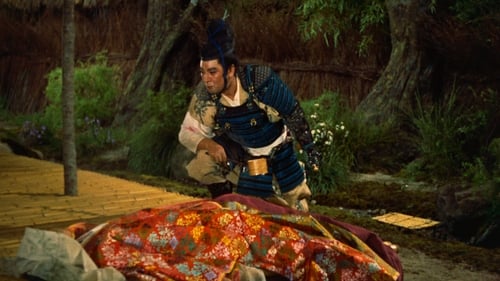
Moritō Endō
Em 1159, durante uma tentativa de golpe contra a realeza, arma-se um plano para que a família real possa fugir. Uma senhora da corte aproveita a situação e se faz passar de esposa de um Lorde para sair da cidade. Ela conta com a ajuda de um samurai, que a escolta com segurança. Mais tarde, o samurai pede ao Lorde como recompensa a mão desta mulher em casamento. Mas ele descobre que ela já é casada. O samurai não irá desistir e chegará a desafiar o marido de sua amada para que a deixe, o que irá gerar trágicas consequências.

Yagoro Hosho
This film stars Tanaka Kinuyo as the mother of the heir to the Hosho name, a famous lineage of Noh actors. The heir, Hosho Yagoro, is played by Hasegawa Kuzuo who went on to become familiar among Ichikawa Kon fans as Yukinojo in An Actor's Revenge, which was also co-written by Ito, adding to the relatedness of An Heir's Place.

Dedication of the Great Buddha is a 1952 Japanese film directed by Teinosuke Kinugasa. It was entered into the 1953 Cannes Film Festival.

Hikaru Genji
Genji, the illegitimate offspring of a Japanese potentate, goes by the philosophy of "love 'em and leave 'em" as a matter of course. Only when his heart is broken by Awaji does Genji realizes how much pain he himself has caused.

Zenigata Heiji
Police detective Heiji is assigned to catch the masked Maboroshi gang of robbers who have terrorized all of Edo leaving few clues as to who their leader is.

Jidai-geki by Ryo Hagiwara

Lord for a Night is a 1946 Japanese film directed by Teinosuke Kinugasa.

Kanbei Kanzamon
In A Tale of Archery, young, timid bowmaster Kazuma (Akitake Kôno) seeks to beat the archery record set by Hoshino Kanzaemon, a mysterious figure who, it is rumored, drove the previous champion (Kazuma’s father) to suicide. Possessed of much raw talent, Kazuma is also very much a coward, holing himself up in an inn run by the kindly Okinu (Kinuyo Tanaka) and generally avoiding confrontation of any sort. Despite his clandestine manner, enough of the locals know of Kazuma’s purpose and an attempt is made on his life. He is saved by Karatsu Kanbei (Kazuo Hasegawa), a samurai who offers to help Kazuma hone his archery skills, though it soon becomes clear that this apparently selfless stranger has several potentially shady ulterior motives.
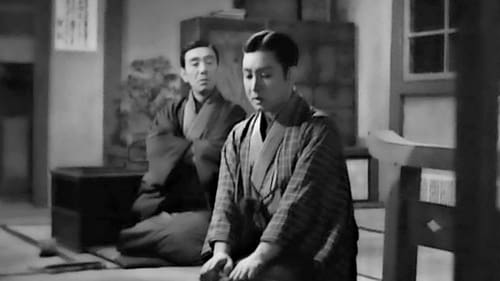
The Way of Drama unfolds in the world of kabuki in Osaka, but also addresses the politics of popular culture and the rivalry between theatrical styles like those used by amateur actors to dramatise contemporary events.

Hagiwara

Kazuo Hasegawa
A 1943 film.

War-time jidaigeki by Eisuke Takizawa. Didn't find anything about it online, but Takizawa was a well-regarded director in his time. Akira Kurosawa worked as A.D. on several of his films.

Hiromasa Nomura World War II era film

A 1942 film.

Hayase
1942 adaptation of Izumi Kyoka's novel.

A bizarre murder at a hot springs resort threatens to disrupt an Edo detective's (Hasegawa) vacation. When his hot-blooded wife (Yamada) starts snooping around, however, he finds himself reluctantly drawn in to the case.

Utaemon Nakamura

Hyakuzô
This epic depicts the battle between Uesugi Kenshin and Takeda Shingen. The focus of the story is the struggle by the unit leader in charge of the main supply wagons and the supply troops to transport materiel to the Uesugi army. To this are added episodes involving an itinerant woman.

Jurobei, a kaisen tonya (wholesaler in port) in Awa, was wronged and killed on the day of the Dance Festival by the evil merchant & the chamberlin. His brother (Kazuo Hasegawa) vowed vengeance on the day of his brother's death. So every year the villains are worried during the Awa Dance Festival (which is part of the Obon festival), but nothing has ever happened, until seven years later...

A sentimental tale of the filial love between shogun Iemitsu (matinee idol Hasegawa) and his loyal old retainer Hikoza (comedian Roppa, playing somewhat against type).

The story is based on the serial novel by Tsunoda Kikuo.

The story is based on the serial novel by Tsunoda Kikuo.

Feature film.

A Japanese army engineer (Hasegawa) on the mainland must put his personal feelings for a beautiful Chinese woman (Ri) aside if he is to succeed at building a highway through the "bandit"- (aka anti-Japanese militia-) infested hinterlands.

Hinokiya Sentarô

The film was produced during Second Sino-Japanese War, before the Pearl Harbor Attack in 1941. The film mainly concerns the training of newly-recruited pilots and their daily life, then their subsequent fighting experiences in China. Army supported the production, providing all the authentic airplanes, training and actual actions. They even provided the older biplanes disguised as Chinese fighter planes. Obinata plays the trainer-turned-combat-leader, who is passionate and cool at the same time. All his boys love him, of course. The film is not as intense, full of sugar-coated camaraderie, until young pilots are killed in action one by one. Last twenty minutes are fairly grim, as the message of self-sacrifice is heard loud and clear.

Hinokiya Sentarô
When Sentarô’s father is killed by a drunken samurai, Sentarô avenges him. His deed puts him on the run and leaves his sister behind. While running from both the authorities and the assassins, Sentarô meets with the beautiful travelling-actress Oshima who takes him under her protection.

Wartime propaganda filmed by the Japanese in occupied China, Shirley Yamaguchi portrays an orphan rescued from the streets by a kindly Japanese merchant marine officer. Part spy thriller and part Shanghai travelogue, it was part of a popular series known as "Chinese Continental Friendship" made by the occupying Japanese in China.

Kokichi Matsumura
Song of the White Orchid was a co-production of Toho and Mantetsu, the railway that served the colonial region of Manchuria, and the first film in the Kazuo Hasegawa/Shirley Yamaguchi (Ri Koran) “Continental Trilogy.” Handsome Hasegawa (representing Japan) runs up against an impertinent Yamaguchi (representing the continent); not surprisingly, in the course of the film the woman comes around and realizes the benevolent intentions of the Japanese. In Song of the White Orchid Yamaguchi leaves Hasegawa, who plays an expatriate working for the railway, because of a misunderstanding. She joins a communist guerilla group plotting to blow up the Manchurian railway. Learning of the subterfuge that led to the misunderstanding, she renews her faith in Hasegawa—and by extension Japan—and tries to undermine the plot.
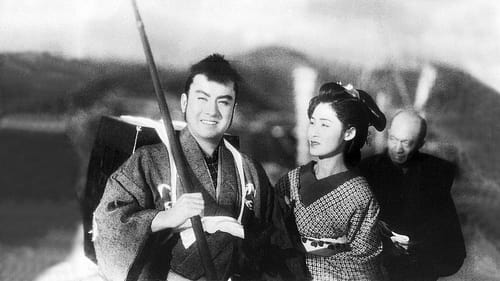
The film tells about the life of the former vassal of the Ako clan - Fuwa Katsuemon Masatane.

Tsurujiro
Drama about a couple and how they found themselves related with music, their egos and each other.

Sakata Tojuro
A colourful study of theatrical life. Two acting troupes vie for the Kyoto market during the Genroku Era. Tojuro, an extremely popular actor, feels the limits to his acting when he sees his rival troupe put on a new type of play featuring its star, Nakamura. He has the famous Chikamatsu write a new play but cannot get used to the character he is to play in it.

The Siege of Osaka

dir: Teinosuke Kinugasa

Echizen'nokami Ôoka
Two cowardly palanquin carriers know the culprit of a murder but are too scared to report it to the police. In the mean time, an innocent man is arrested as the murderer and chaos ensues. Pre-war jidaigeki film.

Yokinojo, Yamitaro and Yokinojo's mother (as Chôjirô Hayashi)
An onnagata (female impersonator) of a Kabuki troupe avenges his parents' deaths. Remade in 1963 as Yukinojô Henge.

Yasuo the Bridegroom
This pair of gentle yet witty and inventive comedies from the director of The Neighbour's Wife and Mine typify both the formal experimentation of early Japanese sound cinema and the social milieux that Shochiku tended to depict. 'Virtually plotless, and feeling more like comic sketches than fully developed stories,' writes Arthur Nolletti, Jr, 'these light comedies, or farces, take a wholly trivial matter (often a socially embarrassing situation) and use it as a springboard for a succession of gags.' Much of the films' distinction comes from the wit of Gosho's direction, the imaginative use of the new sound technology and the charm of the acting, particularly of the heroines (Kinuyo Tanaka in Bride; Hiroko Kawasaki in Groom). Yet in both films, Gosho finds room for some shrewd observation of character and environment, subtly exploring the values and assumptions of the suburban petit bourgeoisie.

Фумио
Jyuta, an honest owner of a taxi company, has a younger half-brother who is involved in the yakuza world and doesn’t get along well with his mother. Jyuta tries to correct him…

Period film from 1934.

Koina no Ginpei
The first half of the movie depicts a man's jealousy of his best friend and the woman he love. The second part depicts a hero who is ready to put the past behind him and risk his life for his friend.

A mournful masterpiece by Kinugasa Teinosuke



Asano Takuminokami and Yoshida Sawaemon (as Chôjirô Hayashi)
This 1932 adaptation is the earliest sound version of the ever-popular and much-filmed Chushingura story of the loyal 47 retainers who avenged their feudal lord after he was obliged to commit hara-kiri due to the machinations of a villainous courtier. As the first sound version of the classic narrative, the film was something of an event, and employed a stellar cast, who give a roster of memorable performances. Director Teinosuke Kinugasa was primarily a specialist in jidai-geki (period films), such as the internationally celebrated Gate of Hell (Jigokumon, 1953), and although he is now most famous as the maker of the avant-garde silent films A Page of Madness (Kurutta ichipeji, 1926) and Crossroads (Jujiro, 1928), Chushingura is in fact more typical of his output than those experimental works. The film ranked third in that year’s Kinema Junpo critics’ poll, and Joseph Anderson and Donald Richie noted that 'not only the sound but the quick cutting was admired by many critics.

In the age of priests and warriors which the film denounces, a woman revolts after she is sold as a prostitute.

Shinzaemon has been Sukeroku’s enemy ever since Sukeroku fought and defeated gangs from Shinzaemon’s group at a Kabuki theatre over Agemaki from Miuraya. Sukeroku swears that he will never draw his sword until he finds his family’s treasured blade, Tomokirimaru, so he gets insulted often by Shinzaemon’s men. Bunzaemon redeems Agemaki for Sukeroku ahead of Shinzaemon, but Sukeroku, ever the gentleman, does not accept. When Shinzaemon snatches Agemaki, it is found that he has Tomokirimaru.

Aizawa Shinpachi
A samurai returns to his homeland after a three year absence and finds his fiance is now one of the prince's concubines.

Benten Kozo Kikunosuke
First film adaptation of the kabuki play Benten Kozo, about a thief who steals from the rich and gives to the poor...














































